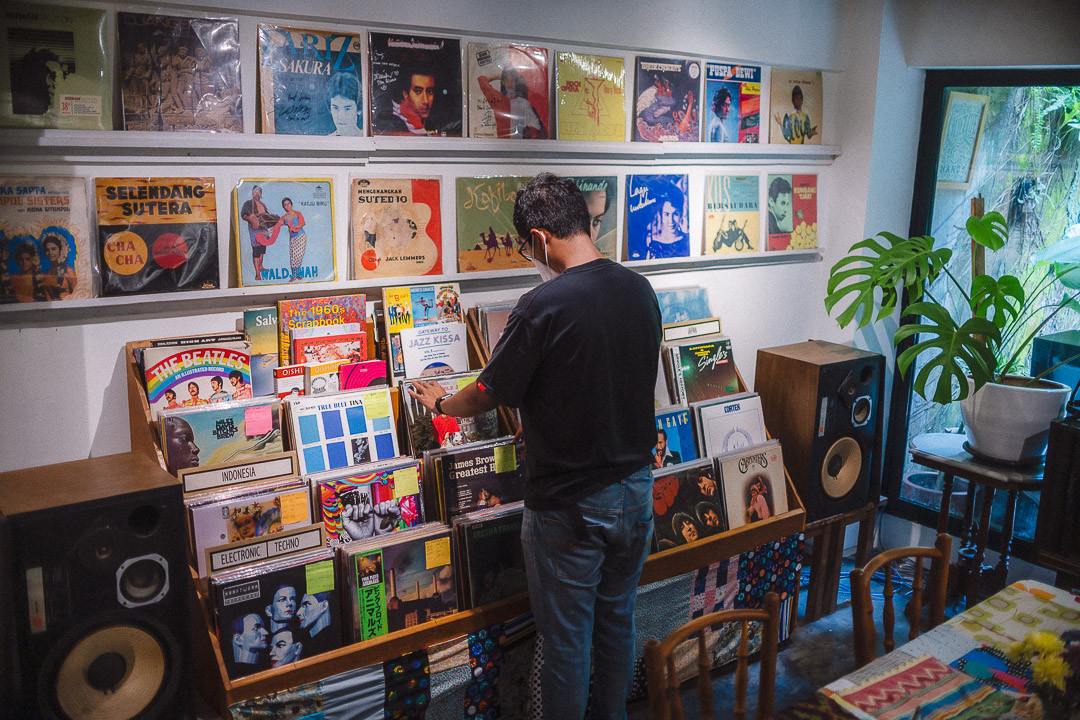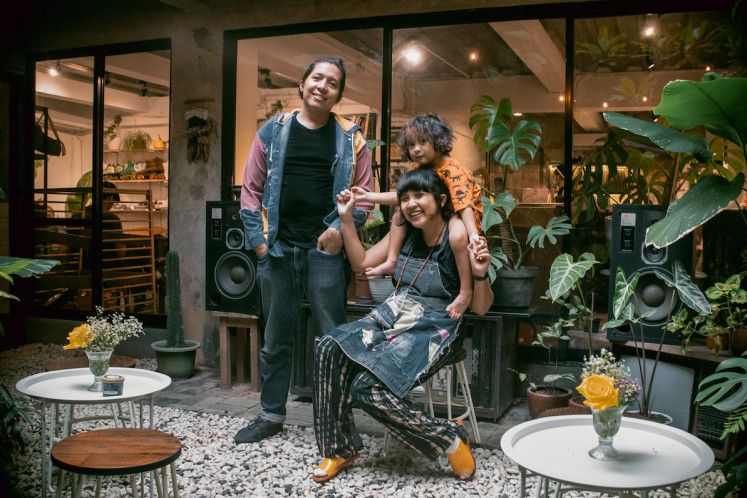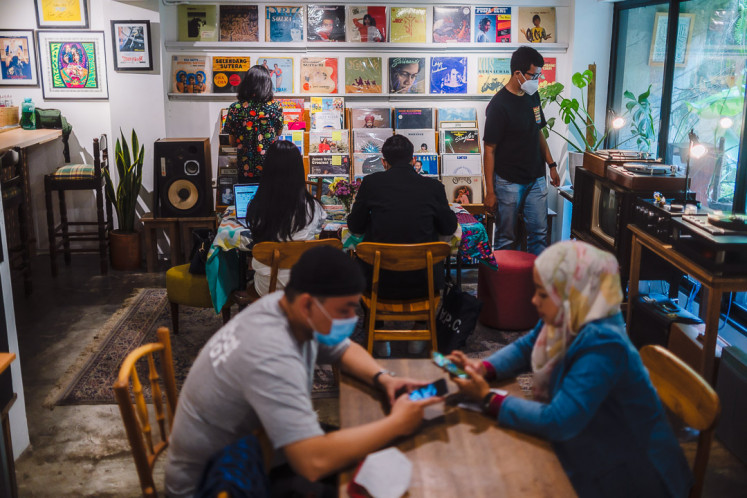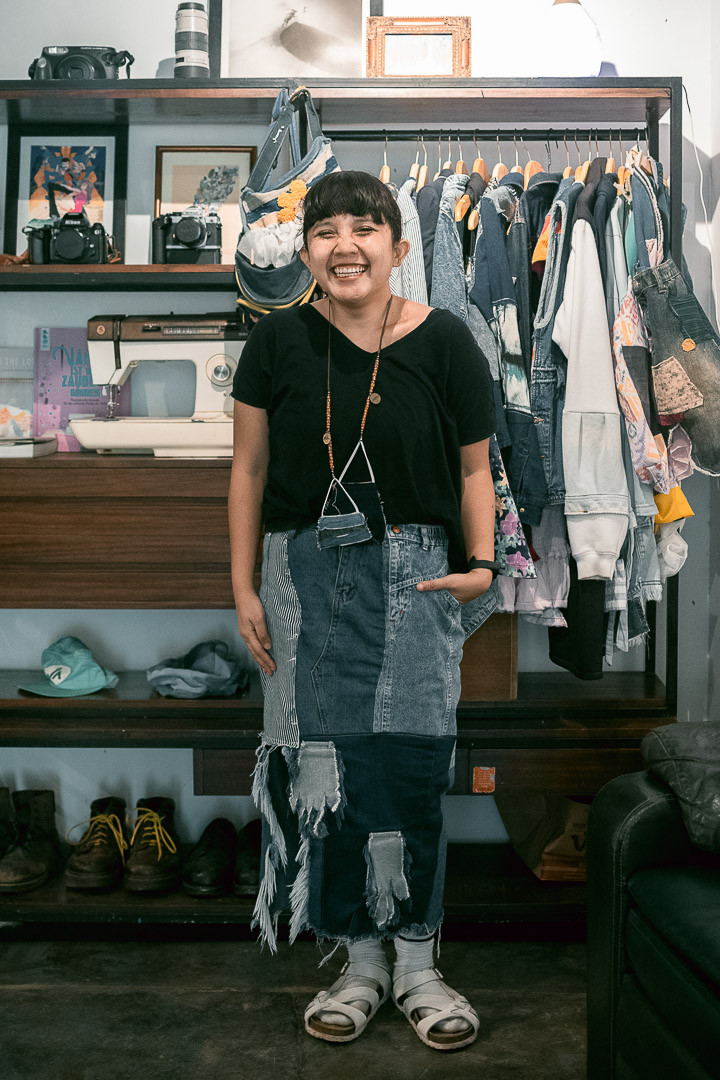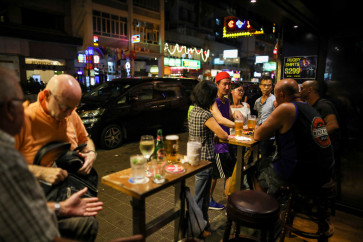Popular Reads
Top Results
Can't find what you're looking for?
View all search resultsPopular Reads
Top Results
Can't find what you're looking for?
View all search resultsSUBO: Jakarta’s first ‘intimate’ listening bar
Exclusively playing vinyl records through high-quality audio equipment in a basement of a house, SUBO aims to provide a comfortable space for people who simply want to relax and listen to music.
Change text size
Gift Premium Articles
to Anyone
A
fter spending a good fifteen minutes trying to locate the address, I found the place I was looking for. It was a unit by the end of a cul-de-sac in a residential area in South Jakarta. A man instructed me to go down to the end of the driveway and open the door by the basement. Inside is a living-room-like space filled with turntables, speakers, rows of records, two tables, chairs and a bar. Some vintage books, upcycled clothes and various memorabilia were also laid or hung on the shelves. Soothing jazz music was coming out of the speakers as I was trying to take it all in.
I was at SUBO, a listening space created by married couple Aria Anggadwipa and Intan Anggita for people who are keen to listen to music “properly”, in a more comfortable and homey setting, rather than, say, going to a club. The homey aspect may come from the fact that SUBO is literally their home. The couple and their 3-year-old son, Teduh, live upstairs but often come down to the basement to enjoy music.
The couple said the idea for the listening space came about because they wanted to listen to music on sophisticated audio equipment but couldn’t deal anymore with the environments that typically come with it. “Events at clubs start late and we simply can’t leave our child,” Aria said, “Plus, the cigarette smoke is usually brutal.”
Aria Anggadwipa and Intan Anggita with their son Teduh. (Subo/Courtesy of Subo)At SUBO, visitors are free to take advantage of the high-quality audio equipment Aria and Intan have collected throughout the years and play any record they want from hundreds of titles available—all of which is Aria’s personal collection—from jazz and Motown to old Indonesian keroncong.
Much like an enthusiastic record store keeper, Aria enjoys sharing historical facts about each piece of his collections. He’s also not unwilling to dive into personal anecdotes.
Picking a Djanger Bali 12” record off the shelf, Aria told me that it was one of the limited-edition copies of the first pressing by Saba Records and explained why it’s one of the most important records for Indonesian jazz music.
“Before 1965, western music was banned by Soekarno, so local jazz musicians survived by playing a jazzy take on traditional music. There’s this American jazz musician called Tony Scott who was living in Southeast Asia at the time. He then joined forces with The Indonesian All Stars (Bubi Chen, Mryono, Benny Mustafa, Jack Lesmana and Jopie Chen) to play Jazzfest Berlin in 1967.”
Aria shared how the All Stars shared the stage with John Coltrane, Miles Davis and Herbie Hancock. His passion for music shines through as he continues the story.
“They were so good that they got a standing ovation and an offer from Saba records to do a live recording. Djanger Bali is still an artefact of Indonesian jazz. I spent nights looking for an original copy on eBay. I got it for Rp2,500,000 ($173), and I believe it’s now worth over $700.”
He then walked over to the turntables and put the record on one of them.
“This is a Garrard 401. I love all my turntables, but this is the only one I kinda revived from a wrecked state. I bought it for Rp500.000 ($34) at a sale in Bandung. The wooden body and the tone arm were missing. I spent 1.5 years looking for all the spare parts before it could function again.
Visitors can relax while browsing through SUBO's collection of vintage records. (Subo/Courtesy of Subo)There are pictures on the internet of Jimi Hendrix and Paul McCartney, two musicians I love, spinning this exact turntable, so it’s a source of pride for me. Out of all the turntables at SUBO, this one also gets played the most for some reason.”
Interestingly enough, most of SUBO’s visitors are not record collectors but people of the general public who are curious about the space and its commitment to a conscious music-listening experience.
Aria recalls having visitors as young as middle school kids. “She came with her dad, but he stayed outside while his daughter was chilling inside with us and her schoolmates,” Aria recalled. “It was cute.”
To complement the experience, SUBO provides food and drinks.
“We’re not a cafe, but when listening to music with friends, people love to eat and drink,” Intan said, “but the main dish is still the music.”
Good vibrations
In 2014, the couple opened SUBstore, a record shop in Pasar Santa in South Jakarta, with the help of Aria’s brother, who sourced the records from Japan. It then grew into a few different locations in Bandung, Yogyakarta and even the retro, hip neighborhood of Koenji in Tokyo.
Under the name Dua Sejoli Selekta, Intan and Aria started DJing and played mostly vintage Indonesian music at weddings and restaurants. Through their earnings and connections to vinyl and turntable collectors, little by little, they started to upgrade their gear into what SUBO is today.
The name SUBO is taken from Summum Bonum, the title of a song by the Taiwanese synth pop band Sunset Rollercoaster, a favorite of the couple, which translates to “the highest or ultimate good.”
Intan and Aria believe that the highest good is about raising one’s “vibration”, something that music is able to do. “When your vibration is lifted, it creates a sense of warmth, happiness and connection,” Aria said. “Music is about being reconnected to a feeling in your soul.”
Keeping it small
To visit SUBO, one has to make an appointment first. Only then you’d be given the exact location. Each visitor’s stay is limited to two hours, and only a maximum eight people are allowed per session.
Intan and Aria say this is to ensure the essence and intimate ambience of the space is maintained. They’ve been very deliberate about not promoting the space too much and relying more on word of mouth.
Though SUBO serves food and beverages, Intan Anggita says the "main dish" remains is the music. (Subo/Courtesy of Subo)“It’s like when you’re travelling and you’ve found a sense of peace at a certain location,” Aria said. “Then you come back sometime after the place has blown up in popularity, and you don’t get that same feeling.”
And it’s not like SUBO lacks visitors. The reception has been more than encouraging, and the space has been fully booked almost every day for weeks now.
Aria adds that the restricted number of visitors per session is not due to COVID-19 and is not likely to change. “With eight people, it still feels like we’re hanging out at a friend’s house,” Aria said. “And we can still converse with each other comfortably.”
The desire to keep things authentic and personal is apparent in SUBO, as every item in the room is either a personal belonging or created by Aria and Intan themselves.
“SUBO is very personal,” Aria said. “We’re letting you come into our private universe.”

